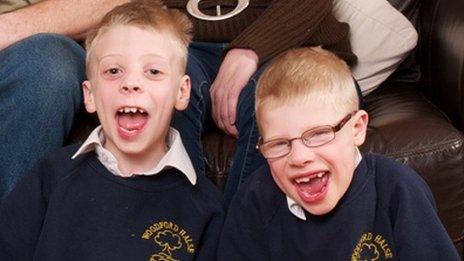'No-one had heard of my boys' syndrome'
- Published

Brothers Alex and Daniel, from Northamptonshire, were born 17 months apart. When older brother Alex arrived, his mum Victoria knew something was not right.
"His spine was curved and I thought his head shape looked strange," she remembers.
His early years were punctuated by difficulties. He was constantly vomiting and hardly slept more than three hours a night. Victoria says it was an exhausting time.
During her subsequent pregnancy with Daniel she was very stressed because she worried there would be something wrong with him too.
"When he was induced he didn't look like Alex, which I was relieved about, but he did have two extra fingers on his hands," she says.
Daniel was also born with a hole in the heart and was rushed for heart surgery when he was just one day old.
Although the boys had very different problems, they had many similarities too. Neither of them were meeting the normal milestones for babies like crawling, walking and potty training - but no-one could give their parents any reasons why.
After much searching in vain on the internet, Victoria went to a genetics consultant when Alex was three and Daniel was one.
Negativity
The discovery that both boys had a rare metabolic condition called Smith-Lemli-Opitz syndrome (SLOS), which results from a failure of the body to make its own cholesterol, explained many of their struggles during their early years.
Children with SLOS have autism spectrum disorders and the most severely affected have birth defects, such as cleft palates, learning disabilities and heart defects.
Giving their problems a name was a relief of sorts - but the diagnosis created its own problems.
Victoria says: "Everyone kept saying 'I've never heard of that'. There's a lot of negativity to these conditions because they are so rare.
People are scared of things they don't understand."
Victoria was initially told that there was no one else in the UK with the condition, but through Facebook she has communicated with around 20 families coping with SLOS. Now she wants to organise a meeting between all the parents and children affected in the UK.
Alex and Daniel are still able to attend their local village primary school, thanks to one-to-one support and lots of understanding from teachers, but their mum is aware that she will soon have to look for a special needs school to educate them - and that is a scary prospect.
"I have no idea how the syndrome will develop. I didn't want to know because it scared me a little, but now I need to know for their schooling - and it's a big worry.
"What will happen when they are adults, when I am not here?"
Cholesterol quest
Filling in the gaps is often the job of scientists working quietly in the laboratory. At Cardiff University Dr Emyr Lloyd-Evans has been given funding by children's charity Action Medical Research, external to unlock the secrets of Smith-Lemli-Opitz syndrome by investigating the processes that cause it and analysing two possible new treatments and how they might work.
Dr Lloyd-Evans explains that the absence of cholesterol in the brains of SLOS sufferers means that the neurons and the central nervous system are affected, causing anything from mild personality disorders to severe malformations and multi-organ disease.
His hope is to understand the causes of the genetic disorder at a cellular level so that it can be treated..
"We are working on improving the distribution of cholesterol within cells in the body - which should improve the effectiveness of dietary cholesterol as a therapy outside of the brain. If we can do that then there is a potential therapy for the patients and maybe we can apply these ultra rare disease therapies to other diseases," he says.
Victoria is holding out for some kind of therapy that would give her boys a more settled life.
Now that Alex is seven years old and Daniel six, their lives are still traumatic and challenging on a daily basis.
They both eat very little, suffer from reflux and regularly vomit - but if they don't eat enough they become tired and irritable.
Both boys have, at some stage, been fed through a tube to help maintain their food intake.
Alex's curved spine meant that at the age of five he had metal rods inserted into his back. They can be lengthened every few months as he grows to avoid more painful surgery.
Every morning Victoria dresses the boys and battles with them over breakfast, before the school day begins.
Victoria says: "It's like the toddlers are still here. They don't have a level of understanding and it's difficult to reason with them.
"We can't tell Daniel granny is coming round soon, because he will wait at the window for a week for her.
"One summer he was wanted it to snow in August and he was distraught that it wouldn't. Then when it snowed he said, 'I want to go to the beach'."
Alex and Daniel have an nine-year-old sister who is fantastic with them, Victoria says, although looking after her brothers' needs takes up a great deal of family time.
Victoria is determined that all three of her children have a fulfilling life, and that they achieve their potential, despite their rare condition.
She is hoping the researchers will find the answer too.